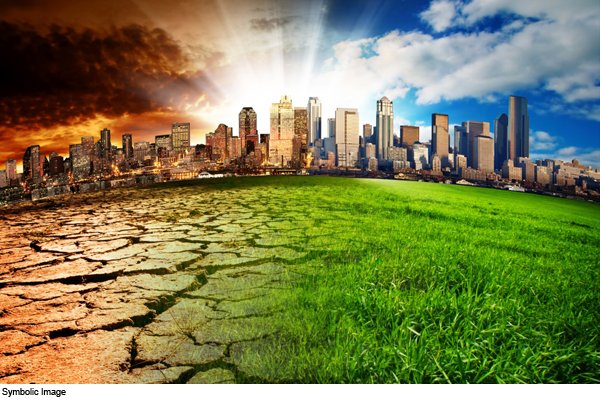The speed currently operates the world, not possible to achieve the goals of the Paris Agreement with the speed and intentions, as well as a result of the effects of climate change, under the current emission schemes, 2050 By World Economy 7-10% The GDP will be smaller and if the action slows down then the world’s GDP 2050 Up to 18% Will be reduced.

It has been revealed by Swiss Re , one of the world’s largest reinsurance companies , which has published an interesting and unprecedented analysis of the economic risks from continued climate change over the next 30 years.
The report gives national data for 48 countries, including all major emitters . Among the results , it is found that by staying on the current path , which will not meet the Paris targets , both the US and the UK will lose about 7% of GDP , China 15-18%, France around 10%, India 17-27. %, Indonesia will lose 17-30%, Japan 8-9% and Australia 11-12.5% .
That is accomplishing the goals of the Paris Agreement and the warming is limited more strictly, will face much less economic damage in every country for the next 30 years. For example, if the temperature increase limited to below 2C UK GDP (gross domestic product) less than 1% loss by 2050 almost 4 will reduce GDP percentage points (net to compare costs of the UK to reach zero emissions GDP As approximate is).
Some important things
· The New Climate Economics Index stress test how climate change will affect 48 countries , which represent 90% of the world economy , and rank their overall climate resilience
· 2050 under different scenarios than a world without climate change Estimated global GDP impact by:
-18% If no mitigation action is performed ( 3.2 ° C increase) ;
-14% If some mitigation action is taken ( 2.6 ° C increase) ;
-11% If further mitigation action is taken ( 2 ° C increase) ;
-4% if Paris Agreement targets are met ( below 2 ° C )
· Economies will be the worst hit in Asia , China in severe scenario about 24% of its GDP Is at risk of losing , and the world’s largest economy , America , 10% Europe is at risk of losing close to 11% Can be lost
Climate change is the biggest long-term threat to the global economy. If no mitigating action is taken , the global temperature may rise by more than 3 ° C and the world economy may shrink by 18% over the next 30 years . But the Swiss Climate Institute’s new Climate Economics Index suggests that if decisive action is taken to meet the goals set out in the Paris Agreement , the impact may be reduced. In today which went promise will require more for; The public and private sectors will play an important role in accelerating the change in Net Zero.
Swiss Re Institute has four different temperatures would like and what the impact on the 48 economies by increasing the ongoing effects of climate change under the scenarios, a stress test to check (stress test). As global warming makes the effects of meteorological natural disasters more severe , it can lead to substantial income and productivity reductions over time. For example, loss of land as a result of rising sea levels, which was otherwise productive can be used and may stress the crop failure of heat. Emerging economies in the Mediterranean regions will be most affected by rising temperatures.
Major economies 30 Around 10% of GDP in years May be lost
In the severe scenario of a 3.2 ° C temperature rise , China could lose about a quarter ( 24%) of its GDP by mid-century . The US , Canada and the UK will all suffer around 10% loss. Europe little more will suffer (11%), while Finland or less exposed economies such as Switzerland (6%), for example, France or Greece (13%).
Thierry Lager , Group Chief Underwriting Officer and Chairman of Swiss Re Institute said: “ Climate risk affects every society , every company and every person. By 2050 , the world’s population will increase to around 10 billion people , especially in the areas most affected by climate change. Therefore , we must act now to mitigate risk and reach Net-Zero targets. Equally , our recent biodiversity index shows , nature and ecosystem services provide enormous economic benefits but are under profound threat. This is why climate change and biodiversity loss are twin challenges we need to tackle as a global community to maintain a healthy economy and a sustainable (sustainable) future. “
Climate Economics Index ranked countries’ resilience to climate change
Swiss Re Institute also ranked their vulnerability as well as to evaluate the expected economic impact of each country’s climate risks, each country in the extreme dry and wet weather conditions. In addition , it saw the ability of countries to withstand the effects of climate change. Overall , these findings generate a ranking of countries’ resilience to the effects of climate change.
The rankings demonstrate a similar approach as GDP impact analysis: countries with the fewest resources to adapt and mitigate the effects of rising global temperatures are often the ones to suffer the most negative effects. The weakest countries in this context are Malaysia , Thailand , India , Philippines and Indonesia. Advanced economies in the Northern Hemisphere , including the US , Canada , Switzerland and Germany , are among the least vulnerable.
